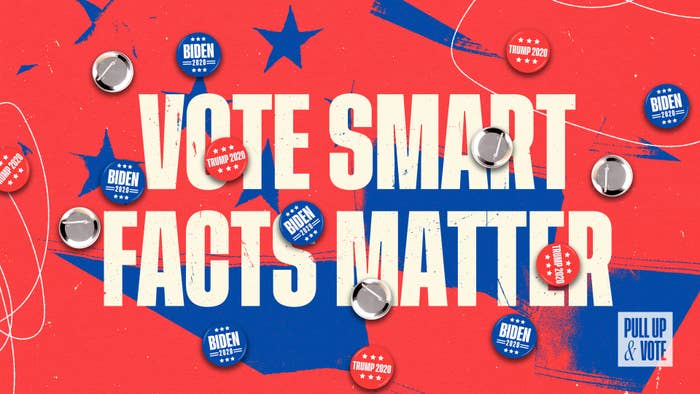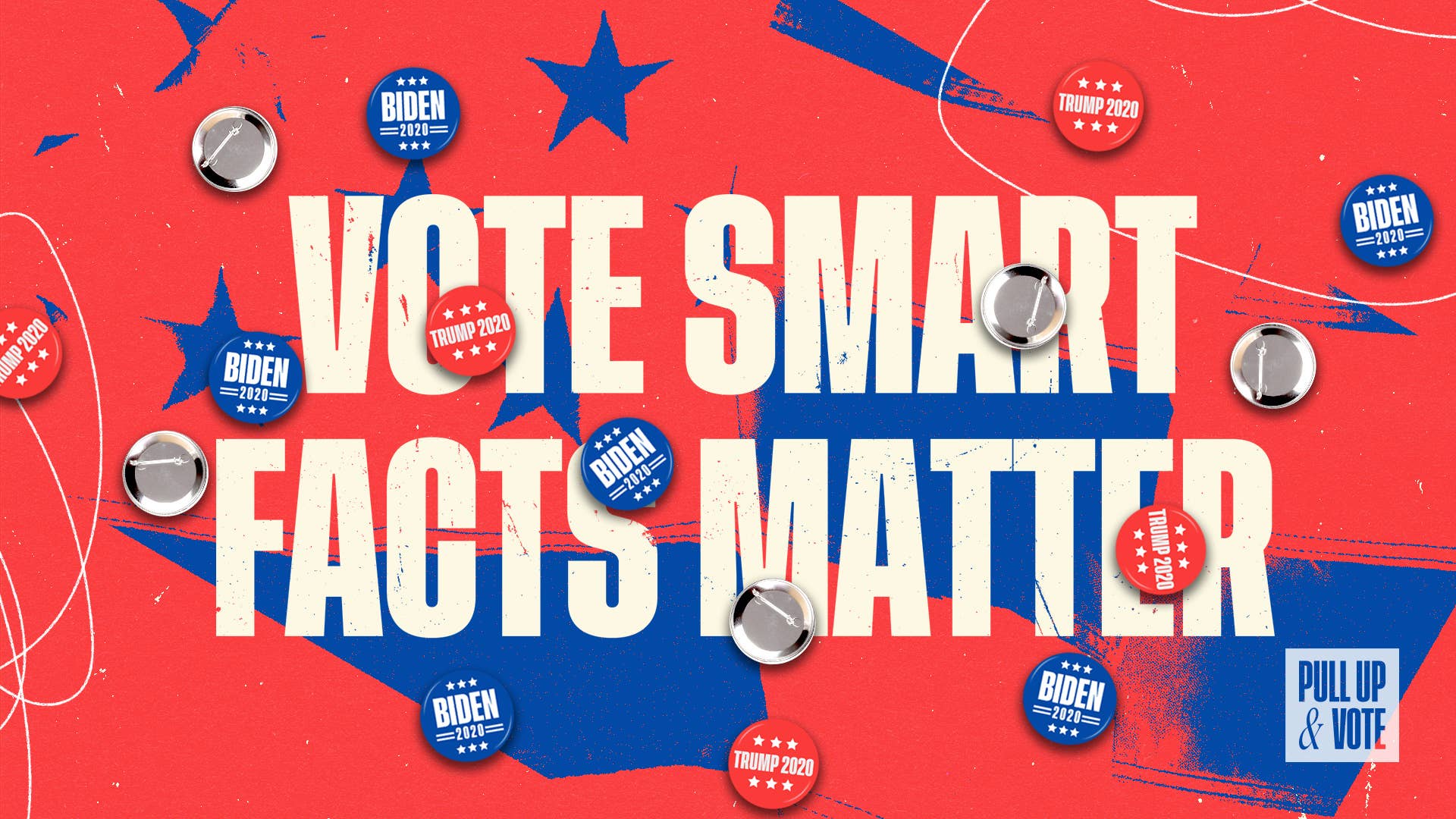
The ongoing Republican National Convention will forever finalize the candidates for the 2020 presidential election. Sure, it’s enticing to set a Twitter alert for the president’s latest unhinged musings in 240 or fewer characters. You might also spend hours trawling YouTube for Vice President Biden’s latest stumble. Yet the funny, the shiny, and the frightening things are rarely the most important.
What does matter is that you know who they are, what they’ve done, and what they stand for (or at least what they most recently said they stand for). The benefit of doing your research when it comes to political candidates is twofold. On one end, it helps you make decisions and dispel faulty biases or opinions. On the other hand—and supremely important in these polarized times—is being educated on the issues gives you the ability to debate the merits of a candidate with anyone. Being armed with facts, not opinions, is what lets people hold constructive conversations.
Here, we’ve gathered up a bunch of resources so voters can better understand the candidates and be more confident voting for or opposing them come this November. All you have to do is read.
In his own words: the books and campaign website of President Donald J. Trump
A presidential candidate’s website is the easiest place to start your research. The opening ask on Trump’s website, as is the case with most politicians, is for money, followed by a link to register to vote, and even a link to request an absentee ballot. You have to look a bit past the landing page to find where the president stands on a variety of issues. That page is called Promises Kept, and is more of a list of the president’s own self-described accomplishments than an accounting of his positions. Don’t worry, more about that further down. Instead, Trump’s presidential website offers a broad list of milestones in areas ranging from education and national security to energy and health care. Some are specific, like a $5 billion federal tax credit on donations that fund scholarships to private and vocational schools, apprenticeship programs, and other educational opportunities. Others are thinner on the details, such as “Project Safe Neighborhoods to encourage U.S. Attorney’s to work with communities to develop customized crime reduction strategies.”
The president has also penned a sizable stack of books that could provide some insight into his life and mind. Of course, they’re all credited to him, and given the president’s liberal definition of the truth, few should be taken at face value. His first book, Trump: The Art of the Deal, became a seminal text for the money-by-any-means bros of the 1980s but has since lost its luster after co-author Tony Schwartz expressed regret for helping the president write it. There’s also the recently released Too Much and Never Enough: How My Family Created the World’s Most Dangerous by his niece Mary Trump that was released in July after the White House attempted to block it.
In his own words: the books and campaign website of former Vice President Joseph R. Biden
While Biden doesn’t have quite as many titles to his name, it could be worth reading his 2007 memoir, Promises to Keep: On Life and Politics, and the 2014 follow-up, Promise Me, Dad: A Year of Hope, Hardship, and Purpose. The books focus in great detail on the hardships faced by the longtime senator from Delaware, who would become vice president, including the 1972 car accident the took the life of his wife Neilia and their one-year-old daughter, Naomi, his two brain aneurysms during his failed 1988 presidential bid, and the passing of his eldest son, Beau, to brain cancer.
Like the president, Biden’s campaign website opens with a request for funds, with a black-and-white portrait of the president unhappily squinching. There’s a lengthy list of promises that cover immigration reform, improved unemployment insurance, and special attention as to how the countrycouldrecover from the lingering pandemic. Like many lifelong politicians (Biden was elected as one of Delaware’s two senators at the age of 29), he now faces endless criticism for changing his positions on a variety of issues, ranging from capital punishment, which he began opposing in mid-2019, to being a supporter of the war on drugs to shifting away from his long-held support of the Hyde Amendment, which restricted the use of taxpayer money for abortions. So while much of what Biden says may sound good to many, it also warrants a bit more examination.
On the veep and potential veep
The vice presidential nomination has long been an important tool for helping the presumptive nominee solidify and further expand their base in hopes of getting over the line. This was even more important as the country remained in a state of upheaval over the police killing of George Floyd, along with hundreds of others whose deaths at the hands of the system have gone unpunished. Kamala Harris, the junior senator from California, was a risky choice due to her history as a prosecutor and, later, as the state’s attorney general who “largely avoided intervening in cases involving killings by the police,” according to a New York Times analysis. The story quoted her 2009 book, Smart on Crime, in which she wrote that “if we take a show of hands of those who would like to see more police officers on the street, mine would shoot up,” adding that “virtually all law-abiding citizens feel safer when they see officers walking a beat.”
Since then, Harris has reformed her positions and battled Republicans on the matter of holding law enforcement accountable. Many, however, say it’s simply rhetoric compared to her resume.
Meanwhile, on the White House’s website, voters can read a brief profile about the 48th Vice President Michael R. Pence, along with a lengthy list of thought pieces written from 2017 up to the present.
Follow the money
Want to know who is donating to who? Open Secrets has both original reporting and campaign finance data for not only the president, but also information on the money behind the campaigns of senators and House hopefuls from across the country. Here, you can also learn more about the political action committee system and dark money, which has exploded in recent years. Or start simple and see who has given how much money to either Trump or Biden.
Find the truth
PolitiFact is a celebrated fact-checking website run by the journalism think tank and training center the Poynter Institute. They analyze all manner of claims from all variety of politicians and rate them on a scale that peaks at “true” and descends to “mostly true,” followed by half-true, mostly false, false, and finally “pants on fire.” You can even check on the accuracy of statements by your favorite candidate or any far side of the political spectrum pundit.
Another option
If PolitiFact’s position as an extension of the media infrastructure is a concern (only 41% percent of Americans in a recent Gallup poll expressed strong trust in the media), consider FactCheck.org from the Annenberg Public Policy Center at the University of Pennsylvania. The website offers a long list of checks on claims made by both Trump and Biden, as well as checks on major news events and everything surrounding election season, such as both parties’ nominating conventions. You can even ask the center a question.
Where they stand
Many people complain about lying politicians, but the truth is that they seem to omit the truth more than tell outright falsehoods. On The Issues helps people get the truth, the whole truth. Please help us. In addition to the four individuals vying for the White House, you can also check on the most recent positions of state and federal lawmakers, as well as cabinet members, prominent mayors, and even members of the Supreme Court. For President Trump, for example, the website offers 36 quotes outlining his positions on corporations, 29 on civil rights, and 27 on jobs. For former VP Biden, there are 26 on abortion, 51 on homeland security, and 15 on welfare and poverty.
A deeper look
One of the greatest criticisms of the president has been his disregard and seeming disdain for the truth. Shortly into his presidency, the lies became so constant that the Washington Poststarted tracking them and as of early July 2020 had found that, after 1,267 days in office, he had made more than 20,000 false or misleading claims. The Post’s database allows you to search for false or misleading claims by topics like the economy, immigration, or taxes, as well as parse out which ones have been repeated most often. You can also see which months offered the most falsehoods. The winner? October 2018, the month before the midterm election, with 1,205 incorrect claims.
Get to know Joe
In the early days of 2020, Politico took a deep look into the life of a manPresident Obama once called a “lion of American history.” It wasn’t always pretty. Biden’s younger years were marred by challenges like poverty, and though he ended up in law school at Syracuse University, he also suffered the loss of his young wife and daughter. In the 1980s, he claimed to have taken part in civil rights marches, though no evidence could be found. He was quoted as saying, “I’m not big on flak jackets and tie-dye shirts,” when explaining why he didn’t march in protests against the Vietnam War after avoiding the draft due to asthma. Biden co-sponsored the Violence Against Women Act in 1994 and voted for the Iraq War in 2002, which he has since said was a mistake.
All of the Votes
Joe Biden served in the United States Senate from 1973 to 2009. Kamala Harris became a senator in 2017. Mike Pence was a member of the United States House of Representatives from 2001 to 2013 before becoming governor of Indiana. All of their jobs while serving in these legislative bodies were to cast votes on behalf of those they represented. Vote Smart helps you find full voting records for all of them, giving you the ability to match up what they’re saying with the decisions they’ve made. Then, you decide for yourself.
Do a deep dive
Ballotpedia calls itself “the digital encyclopedia of American politics and elections.”
“Our goal is to inform people about politics by providing accurate and objective information about politics at all levels of government. We are firmly committed to neutrality in our content,” it says. Have you ever jumped on Wikipedia to research something important and ended up reading about the Battle of Jushi between ancient China’s ruling Han Dynasty and the Xiongnu tribal confederation for control of the people of the Jushi culture in the Turpan Basin in Western China in 67 BC? Ballotpedia offers the same time-burning delights for American politics current and past. In addition to running coverage of political news from across the country, it provides background about each candidate’s bid for the presidency, news coverage, policy positions, and voting records. As of Aug. 26, there are 69 days until Election Day, and that might be enough time to get through most of the information there, if you start now.
Don’t forget that you can do your part by visiting Complex's Pull Up & Vote site—where you can double-check your registration, register to vote if you haven’t, and request a mail-in ballot.

